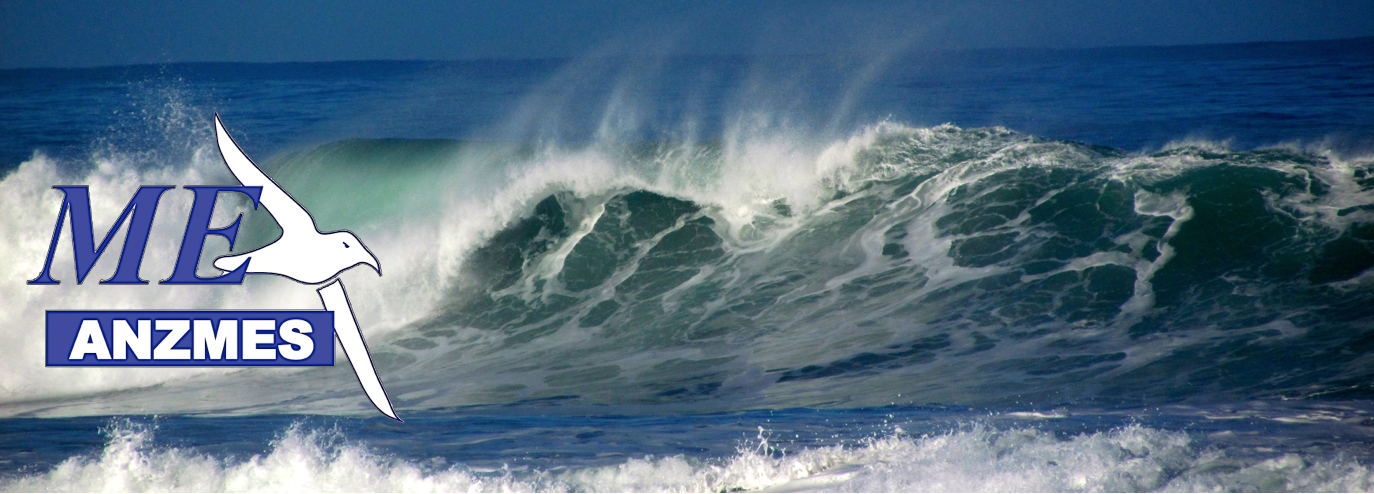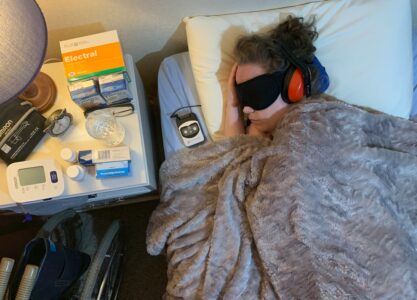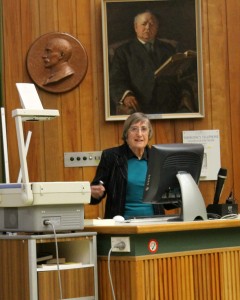Today, May 3rd the Associated New Zealand Myalgic Encephalomyelitis Society Incorporated provided an oral submission to the Health Select Committee, which was live streamed.
You can watch it here:
Due out next week, for ME/CFS Awareness month, is a special episode of Know M.E. video podcast featuring ANZMES president Fiona Charlton, Executive Committee Member Wendy Matthews, Emeritus Professor Warren Tate, and RNZCGP’s Fellow Dr. Sarah Dalziel. These four discuss the oral presentation, how they think it went, and what we hope to achieve through this petition and consideration by the Health Select Committee.
The speech by ANZMES is presented here:
Tena katou katoa. Members of parliament, thank you for the opportunity to present further testimony in support of our petition. I am Fiona Charlton, president of ANZMES and I’m joined today by Emeritus Professor Warren Tate and RNZCGPs Fellow Dr. Sarah Dalziel who can answer your questions.
We understand that you have invited representatives from Whaikaha and Ministry of Health to also speak today.
In the written submission by Whaikaha, they recognise that ME fits the criteria for disability. But the responsibility lies with other government agencies to provide services. There is nothing dedicated to the unique needs of pwME.
The Ministry of Health states that the system doesn’t require people with ME (pwME) to be classed with a disability to access services. This unfortunately lacks understanding of what happens in practice, what pwME experience when trying to access services, and what the reclassification would mean for pwME. We invite representatives to meet with us to discuss ways in which the government can better support pwME.
Key points for you to please understand and consider:
- ME is a disability. Post Exertional Malaise – the cardinal symptom of ME causes symptom exacerbation which is often misunderstood and makes levels of disability difficult to assess without adequate knowledge and education of the condition.
- When you understand PEM you understand that pwME have to choose between making a meal and attending an appointment outside of the home. They have to choose between taking a shower and doing laundry. It is a constant battle between tasks and the energy capacity to function enough to carry out those tasks.
- ME is a disability because of this energy limited capacity. It is a condition that impairs the ability to function on a regular basis both cognitively and physically and this frequently confines people to their home and beds, causing unemployment and an inability to perform basic tasks of daily life.
- ME/CFS is a disability. There is no known cure. For many it is lifelong.
- ME is a disability. It fits the definition, Whaikaha has also submitted that ME fits the definition.
- The United Nations report to the government recommends that people with ME/CFS should have access to the disability support system and be included in disability policies and programs.
We created this petition to draw attention to the fact that the system is not working for pwME. Many fall through the cracks, many rely on whanau to care for them. Those who aren’t lucky enough to have family to care for them, experience PEM crashes regularly just trying to make a meal or do laundry. This means they’re in a constant state of unwellness.
- Yet the eligibility criteria are inconsistent throughout the country resulting in a postcode lottery for health care. Besides the direct practical ramifications of this, it is a health equity issue.
- The inconsistent criteria mean that in practice, the majority of pwME are unable to access services that the Ministry of Health state is available.
- People with ME are theoretically entitled to support under the chronic illness classification, however they’re NOT receiving it in practice.
- The Needs Assessment and Service Coordination (NASC) organisation who assess home help eligibility confirm that ME patients are NOT considered for assessment. The closest equivalent disease, Multiple Sclerosis (MS), is accepted for assessment, despite evidence that MS has lower prevalence and less associated functional disability than ME.
- The vast majority of pwME do not meet the criteria for home help under the Long Term Support – Chronic Health Conditions designation. Which is targeted at the over 65, those with very high needs, or for conditions such as diabetes.
- Even those with ME with very high needs that do meet the criteria, get insufficient care and the care role falls to family. For example a 22 year old with severe ME who is bed bound, unable to feed herself, unable to toilet herself, bathe herself, she’s unable to speak and on a liquid diet. She’s unable to leave her darkened room due to extreme sensitivities to light, sound, touch. Her mother is now her fulltime carer, leaving her nursing job, reducing the family’s income, yet they’ve only been granted 22 hours of care per week from an outside professional and currently only 11 hours of this can be supplied due to staff shortages. That mother, who has given up paid employment to care for her daughter, is only given 11 hours break per week.
We call for standardised nationwide criteria and policies that recognise the severely debilitating nature of this condition.
We call for funding. Currently there is no dedicated funding invested by the government for the wellbeing of people with ME/CFS, including no funding for research, despite its increasing prevalence.
In 2012 the Health Select Committee recommended the reclassification of ME to disability to the government after hearing our first petition. This recommendation was not implemented by the government.
We urge you to also make this recommendation, but be active in ensuring this results in real, practical change for pwME. With recognition and access to services they deserve.
Early intervention promotes recovery. Access to support promotes improved outcomes. It can help prevent further disability, further worsening of the condition which often requires hospitalisation. Access to home help enables a person with ME to potentially do a work from home job, if they can choose to use their limited energy on paid employment rather than making a meal, doing laundry, getting the children off to school with a packed lunch.
It’s not just about home help.
Being classified as a disability demonstrates the government understands how truly disabling this condition is. It legitimises ME and provides protection of rights as a disabled person. It will enable them to fit into the criteria for NASC assessment and home help services.
We recognise that the government has done some work for people with long COVID (LC). The advisory produced guidelines. There are long COVID clinics getting ready to open in 4 main regions of Aotearoa. But people experiencing PEM (which those with LC do just like pwME) will find it very difficult to make it to appointments. ANZMES and Complex Chronic Illness Support and other ME organisations have the solutions. We’re already helping pwLC and ME, so come to the table and discuss with us how best to supply the services required. We have the lived experience, the knowledge, and the expertise.
A change in classification would be a lifeline to dedicated support and wider acknowledgement that their illness is disabling, providing fairer access to established support and care.
We urge you to stand with us and help pwME.
If ANZMES had more than the allotted 10 minutes, we would have made more valid points such as:
The criteria for Home Help currently exclude pwME as sufficiently disabled, despite significant disease burden and limited functionality.
In order to be diagnosed with ME/CFS a person must be significantly impaired in terms of functioning in daily life, such as work or school, however the condition fluctuates in severity, with periods of remission and relapse.
ME is widely misunderstood: despite the increasing awareness and research proving the biomedical basis of the illness it is still often dismissed as a psychological condition or malingering, resulting in a lack of support from society and official support networks – further compounding the disability.
The most fundamental insight from research into ME/CFS and now also Long COVID is our understanding of Post Exertional Malaise and the importance of pacing. When supported adequately and no longer pushing through symptoms, people are able to prevent their illness from worsening and this approach is now part of best practice health care recommendations. Many doctors, welfare assessors, insurance assessors don’t adequately understand PEM, leading to denial of needed services or financial support and may demand pwME undertake ineffective or harmful therapies. Education is key here but this is a long-term strategy and a disability classification would send a strong signal and help people right now.
The World Health Organisation’s International Classification of Functioning, Disability, and Health (ICF) model establishes three levels of human functioning: (1) at the level of body or body part (body structures and functions domain), (2) the whole person (activities domain), and (3) the whole person considered in a social context (participation domain). In this classification, disability implies a certain degree of dysfunction at one or more of these same levels: impairments, activity limitations, and participation restrictions, respectively.
ME/CFS meets all levels of this definition of disability and in fact meets all definitions including those of the New Zealand government. Several symptoms contribute to disability for people with ME/CFS including fatigue, cognitive dysfunction, pain, sleep disturbance, post exertional malaise and autonomic dysfunction. These can have a significant impact on daily life, for example dysfunction of the autonomic nervous system can mean that a person is dizzy or faints when they go from sitting to standing.
An estimated 40,000 people suffer with ME/CFS in NZ and now we add to this 30,000 with unresolving long COVID.
Our surveys show that despite the fact that at least 25% of people with ME/CFS are severely ill and bedridden and 60% are severely debilitated and housebound, they are unable to access funded care set out for this kind of disability, even when their doctor has referred them.
Our surveys also show that people with ME/CFS, in NZ, feel ignored, isolated and their quality of life is low and this is largely due to a lack of support.
Quality of life is significantly lower compared with conditions such as cancer, depression, heart disease, diabetes, and rheumatoid arthritis. Many of these conditions have larger funding pools and patients can often more easily access home help.
A disability research programme in the UK, known as DRILL, found that “people with a wide range of different diagnoses share a lived experience of chronic illness that goes far beyond ‘fatigue’.” The research group developed the term ‘energy impairment’ to describe this experience and Energy Limiting Conditions as a broad cohort that experience disability. They include Fibromyalgia, a range of neurological, musculoskeletal, auto-immune and respiratory diseases. Their work is worth reading to gain insight into their perspective on the experience of energy impairment as a disability, in particular they state that fatigue is seen as being at the bottom of the disability hierarchy despite being very impactful on day to day activities like showering. For people with energy impairment, inequalities stem from this kind of attitude and practice of disbelief and invalidation that diminishes their lives.
ANZMES has provided a written report (to accompany the petition) with a series of solutions, which begins with reclassification and includes dedicated funding, a contract for wraparound services and the creation of a tailored support structure with a tiered system that recognises the varying degrees of disability experienced by people with ME/CFS. We also recommend that we align our health care approach with the latest research and recommendations by implementing a multi-disciplinary pilot.
From a person with ME/CFS:
Getting up to the bathroom feels like a marathon. Every part of my body hurts and I feel as if my limbs are weighed down by something. My thoughts are clouded and escape me like they are lost in a thick fog. Today, I will choose between having a shower and making a meal before my legs give way altogether. The chores pile up around me and I feel as though I am being swallowed alive by this illness. I watch life pass me by in a blur and cling to the hope that tomorrow will be better.
Together we stand and ask to be seen, to be heard, and to finally be supported.
Home help is declined for an individual with impairments, if there is a family member who can do the chores for them. This means that family members have to take on care roles, instead of a professional coming into the home to carry out those duties. It changes the family dynamic when someone, usually unqualified in healthcare, has to bathe a family member, cook for them, help them to the toilet, or to the lounge because they can’t walk unaided.
When asked by the Health Select Committee if reclassifying would help people with ME/CFS, Whaikaha representatives stated that it would enable pwME to gain access to services, such as home help support. Martin Chadwick, Ministry of Health representative also stated that reclassification would enable NASC assessments and recognition for the condition.
We look forward to due consideration by the Health Select Committee and await their report, in which, we hope that they make the recommendation to reclassify ME/CFS as a disability, and put forward the solutions that ANZMES have presented. This is the first step. It is then up to the government to implement the recommendations, and this step is long over due.




